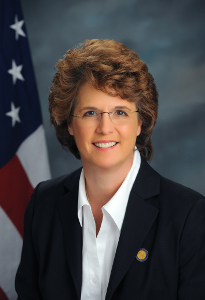The future of an onsite health clinic for state employees is cloudy because of questions of cost and whether it’s used by enough workers to make it beneficial.
The state Health Care Commission, which oversees state employee benefits, is considering whether to renew the contract for the clinic in downtown Topeka.
Some commission members are questioning the cost of the clinic, which started out as a pilot and isn’t being used as frequently as originally projected.
The health center opened as a pilot in May 2019 and has seen 2,519 patients through the end of June, far less than what originally had been estimated.
The $2.4 million yearly contract with Marathon Health to run the clinic on Kansas Avenue lapses at the end of the year.
Now, the commission is deciding how to proceed.
Officials from the State Employee Health Plan, which funds the clinic with insurance premiums, recommended extending the contract with Marathon Health through December 2022.
They recommended seeking requests for new proposals to run the clinic in the spring of 2022 with an eye toward awarding a new contract in September 2022.
But the commission is balking at the idea until it can get more details about expenses, the patient load and the process for allowing a new company to operate the clinic.
There are also questions about why the company that operates the clinic is only meeting about half of its performance goals.
The commission last week postponed a decision on the contract until August when the issue will be taken up again.

Insurance Commissioner Vicki Schmidt, a member of the Health Care Commission, has been one of the more vocal critics of how the clinic has been run.
She has suggested the possibility of letting the clinic close, pointing out that it’s a savings that could be used to help offset insurance costs for employees.
“I have significant concerns,” Schmidt told the commission last week.
At the outset, it was assumed that the clinic would generally be used by state employees on the health plan – minus retirees – who lived within 30 miles of the Topeka clinic even if it was available to workers statewide.
The state estimated that 16,800 eligible health plan members within that 30-mile radius – 8,000 employees and 8,800 family members – would use the service.
It was anticipated that 50% of eligible employees – or 4,000 – would use the clinic in the first year and by year three it would be used by 60%, or 4,800 employees.
New data shows that only 24% of eligible employees – or 1,940 – have used the clinic since it opened two years ago.
It also was estimated that 20% of employee spouses and children would use the clinic. The data shows it’s only being used by 6.6% of the eligible population.
“I will not support spending another $2 million in taxpayer dollars, per year, on a facility that has failed to meet 50% of agreed upon metrics and was designed to only serve a select portion of state employees,” Schmidt said in a statement after the meeting.
Health plan officials noted that the clinic was hit hard by COVID-19 when many state employees were ordered to work from home during the early days of the pandemic.
Visits to the clinic dropped off substantially in April and May of 2020 from earlier in the year before the pandemic hit the state.
For instance, patient appointments fell by 77% from January 2020 to April 2020. They were down 75% in May 2020 from January 2020.
“You have a lot of things that worked against it,” said Janet Stanek, director of the State Employee Health Benefits Program.
However, Schmidt says the cost per patient is exorbitant even without COVID.
In January, the cost per patient was $510 in January 2020, rising to $2,784 in May 2020 as patient visits dropped off.
In May of 2021, Schmidt said the cost is still at $950 per patient.
“I’ve got to tell you, I don’t know of a physician’s office out there that wouldn’t have loved to have had steady income during COVID and that’s what Marathon had,” Schmidt told the commission.
“They could see zero patients in a day and have that same income,” she said.
Officials from Marathon could not be reached for comment for this story.

Questions were raised about the extent that state employees living outside the 30-mile Topeka radius knew the clinic was available to them.
“I didn’t see this really promoted early on. I don’t know how many employees knew it,” said Republican state Rep. Brenda Landwehr, who sits on the commission.
Stanek agreed that there may be a misperception that the clinic is limited to only employees who live close to the Capitol.
“I do believe that’s a misnomer that’s out there that it’s only for people that live within 30 miles,” Stanek said.
“That’s never been true or the case, but I would probably agree maybe it was never communicated to the level that it could be,” she said.
The idea of a health clinic for state employees first surfaced in the Kansas Legislature with a bill backed by former Republican state Rep. Erin Davis in 2017, months before she took a job at Cerner. The bill didn’t pass.
A proviso was added to the state budget requiring the Department of Administration to seek bids for a health clinic but no one met the bidding requirements.
The secretary for the Department of Administration met with lawmakers and agreed to present proposal to the Health Care Commission to consider.
The commission voted to seek proposals for the health center.
Marathon was ultimately selected as the vendor with a contract that officially started in September 2018 although the clinic didn’t open until May 2019.
The goal of the health clinic was to be an additional benefit for state employees to have access to convenient and affordable healthcare.

The aim was to provide a greater focus for state employees to develop healthy habits, concentrating on preventative care that would hold medical costs down.
Department of Administration Secretary DeAngela Burns-Wallace, chair of the commission, agreed that some adjustments may need to be made although she supports keeping the clinic in place.
“The current provider that we have may not be the best fit for where we are and where we want to go,” Burns-Wallace said.
“I am not in a place where I am ready to just simply walk away from the idea of the onsite clinic site itself, but looking to have the right vendor that helps us reach those original goals,” she said.
Republican state Rep. Carolyn McGinn, a member of the commission, said in an interview she wasn’t ready to close the clinic but wants an evaluation of the services it provides.

The clinic provides health screenings, treats patients who come down sick, health coaching, lab services as well as counseling.
“Are we providing the correct services for a clinic?” she asked. ”
“Are we providing long-term counseling for people when maybe they need to be going elsewhere?
“Maybe it should be short-term counseling with some recommendations in the future.”
McGinn said there’s a benefit to having a health clinic close to the Capitol, but she also raised the question about whether all state employees know it’s available to them.
“I also don’t think it’s well advertised for all state employees,” she said.
Landwehr said in an interview this week that she doesn’t have enough information to form an immediate opinion on the future of the clinic.
She wasn’t ready to accept COVID as an excuse for the clinics failure to meet it projection for patient visits.
“They can say there were some things on COVID, but I would suspect we’re going to find a lack of marketing was kind of an issue on it.”
Last week, Landwehr said now is the time for Marathon to explain what’s happening with the clinic before a decision is made.
“If Marathon staff and employees are worried about what’s going to happen, they have an ample opportunity right now to step up and say, ‘Hey this is what we’ve done, this is what we can do better and this is what we can provide tomorrow,” Landwehr told the commission.
“They have that opportunity between now and before we make that decision.”















